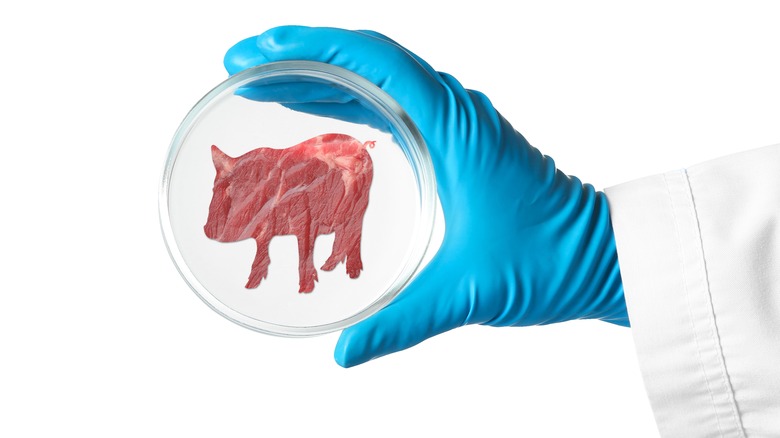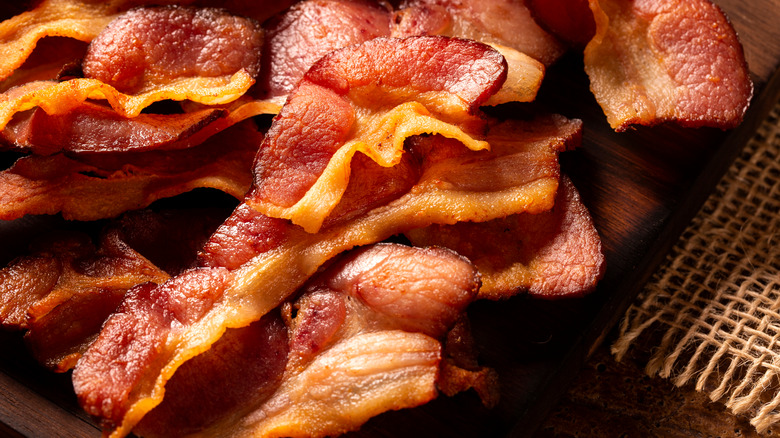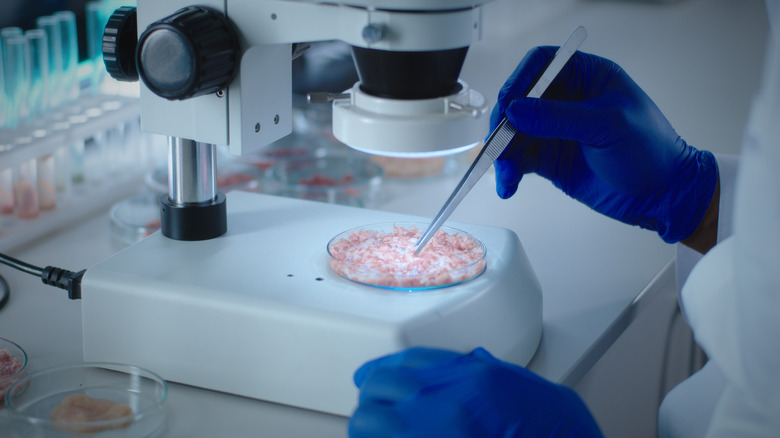How Lab-Grown Animal Fat Could Make Plant-Based Meat Better
When they first appeared on the scene, plant-based meat alternatives seemed like the future of eating. Brands like Beyond Meat and Impossible Foods made a huge splash in the 2010s, creating a new culture of animal-free eating that reached beyond vegetarians and vegans. Focus turned to climate change (the U.N. estimates that 14.5% of greenhouse gas emissions come from animal agriculture), with plant-based meat producers portraying themselves as heroes in the face of this threat. Impossible Meat told customers that they can "save the planet" by switching to meat alternatives. The message hit home; sales of refrigerated plant proteins grew 59% in 2019 and 75% in 2020. But then momentum halted. In 2021, the market grew just 1%, (via Food Business News); and, in 2022, it didn't grow at all (per Deloitte).
There are multiple factors behind this dramatic slowdown. Firstly, plant-based meat alternatives are more expensive than meat itself, costing more than twice as much as beef and four times as much as chicken on average, according to Good Food Institute. With the inflation woes of the past two years, fewer people are willing to pay the higher price. Concerns have also been raised about the processed nature of meat alternatives. But the biggest obstacle for plant-based meats remains the same as always: They can't replicate the flavor and texture of real meat.
There are startups developing lab-grown meat — molecularly identical to animal meat but grown from cell samples. However, they're unlikely to be perfected anytime soon. Until then, there may be another solution: lab-grown fat.
The upside of fat
There's a reason we crave fatty foods, and we can pin the blame on our primitive ancestors. Fats carry a lot of calories, making them extremely energy dense. In a time when human beings lived more active lifestyles, and sustenance was harder to come by, fatty foods served as a valuable fuel. Thus, a craving for fat became a universal human trait. Fat makes the act of eating vastly more pleasurable, its most notable contributions being flavor and texture. The absence of fat is what makes lean meats like chicken breast and filet mignon far less flavorful than fattier counterparts like chicken thighs and ribeye steaks. Fat is also responsible for the unctuous juiciness of the latter two.
Flavor and texture have been the biggest hangups for plant-based meat alternatives, and both of those problems come down to fat. Brands like Impossible Foods and Beyond Meat use blends of plant-based oils to fill the place of fat, but the substitution doesn't really work. While animal fats are solid at room temperature, plant oils tend to be liquids (the notable exception is coconut oil, though it has a very low melting point compared to animal fat). Consequently, plant-based meats tend to turn out greasy. Unfortunately, the only thing that can fill the role of animal fat is animal fat, but there is a way to work around this. Combining plant-based protein with lab-grown animal fat could create a much more accurate simulation of meat.
How lab-grown fat works
Lab-grown fat follows the same basic concept as lab-grown meat. Instead of slaughtering livestock, producers collect cell samples from living animals and place them in a bioreactor. The cells are fed with plant-based proteins and sugars so that they multiply. As long as you keep adding sugars and proteins to the bioreactor, your supply of fat cells can grow indefinitely. Lab-grown fat could be commercially available much sooner than lab-grown meat, as it's easier to synthesize fat cells than muscle. Muscle is made up of many kinds of cells arranged in fixed fibers, whereas fat consists of one type of cell and has a very loose form. The quickest solution to the problems of flavor and texture is to combine lab-grown fat with plant-based meat.
Multiple startups are developing such combinations. San Francisco-based producer Mission Barns managed to create a strip of bacon so close to the real thing that it nearly fooled a reporter at The Atlantic. This could sway some die-hard meat lovers out there, but it also presents an ethical quandary for vegetarians and vegans. Since lab-grown fat is identical to animal fat, and the original cells are obtained from an animal, is it actually an animal-free product? How would lab-grown fats affect other dietary restrictions such as kosher and halal rules? This is such a sci-fi concept that it's hard to wrap one's brain around, and it could take a long time to understand not only the science but the ethics behind lab-grown fat.


